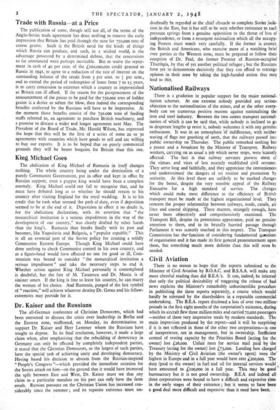Civil Aviation
There is no reason to • hope that the reports submitted to the Minister of Civil Aviation by B.O.A.C. and B.S.AA. will make any more cheerful reading than did B.E.A.'s. It can, indeed, be inferred that only the political desirability of staggering the release of bad news explains the Minister's remarkably unbusinesslike procedure in publishing the three reports separately, a course which would hardly be tolerated by the shareholders in a reputable commerehd undertaking. The B.E.A. report disclosed a loss of over two millions pounds in the first eight months of the corporation's existence, during which its aircraft flew three million miles and carried 72,000 passengers —neither of them very impressive totals by modern standards. The main impression produced by the report—and it will be surprising if it is not reflected in those of the other two corporations—is one of inexperience, not in management, but in ownership. Inefficient control of seating capacity by the Priorities Board (acting for the owner) lost £26,000. Unfair rates for service mail paid by the Treasury (acting for the owner) lost £73,000. Landing fees charged by the Ministry of Civil Aviation (the owner's agent) were thee highest in Europe and in a full year would have cost jzoo,000. The duty (paid to the owner) in fuel and oil for internal services would have amounted to £roo,000 in a full year. This may be good bureaucracy but it is not good ownership. B.E.A. and indeed all three corporations were bound to have a difficult and expensive time in the early stages of their existence ; but it seems to have been a good deal more difficult and expensive than it need have been.






































 Previous page
Previous page